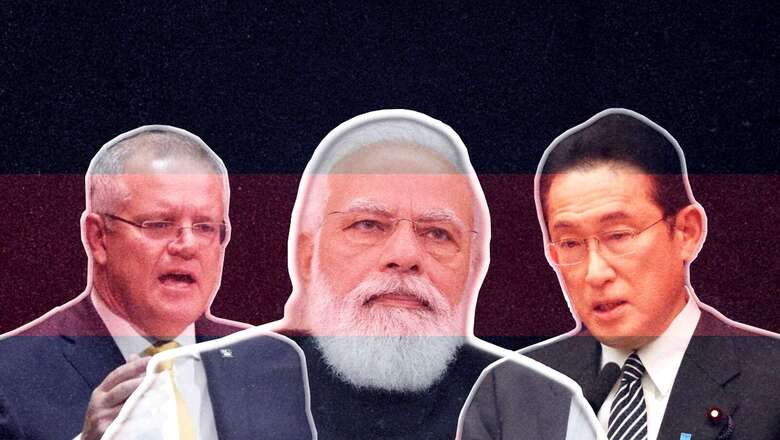
views
With their recent back-to-back meetings with Prime Minister Narendra Modi, Japanese Prime Minister Fumio Kishida and Australian Prime Minister Scott Morrison have sent a strong and united message to the Biden Administration— the Quad’s Indo-Pacific agenda should not fall out of focus and that involves preventing the dilution of the Quad’s apprehensions about China. They have signalled that India’s stand on the Russia-Ukraine crisis, while being the odd one out in the Quad, will not derail their plans to work with India, leaving the door open for the US to follow suit.
Amid India’s lone resistance to USA’s pressure to pick its side against Russia, Japan and Australia, with their strategically-timed meetings with India, have hinted that they stand firmly with India and understand India’s position on Russia. Despite having done their own bit towards pleasing the White House with their condemnation of Russia, Tokyo and Canberra have made no heavy-duty efforts to force the same on New Delhi, leaving the Biden administration rightly stranded in the Quad with just one option to stay relevant, that is, by accepting the Quad’s core agenda as preserved and defined by the other three Indo-Pacific members.
This also comes at a time when President Joe Biden has been awfully generous and servile before Chinese President Xi Jinping in a vain attempt to break the Russia-China nexus. This exacerbates fears that the US has lost its way.
Also Read: Dumping Taiwan, Embracing Jinping: Biden’s Capitulation Before China Marks An Ominous Shift
While President Joe Biden has called India’s position “shaky” and highlighted Japan and Australia’s support for the USA amid heightened tensions with Russia, Kishida has announced a $42 billion investment plan for India in a span of five years, and Australia has sought greater cooperation with India in mining critical minerals on Australian soil and announced $204 million investment of its own in India. In fact, the Australian PM, while mentioning Russia’s actions in Ukraine, welcomed Narendra Modi’s leadership “within the Quad to keeping us focused” on the importance of “cooperation between like-minded liberal democracies” in achieving an open, inclusive, resilient and prosperous Indo-Pacific.
Preserving the Quad’s Focus
There would be something definitely wrong with the Quad if it starts discussing a European war and downplays the belligerence of the Chinese authoritarian state in the Indo-Pacific region— and this is exactly what Biden is imposing on the Quad. For the Biden Administration, the Quad is less about containing China or holding it accountable for its excesses than about exercising control over the three members, which happen to be powerful democracies and formidable economies whose views matter, certifying his diplomatic mastery before the American audience.
Also Read: As India Buys Russian Oil, Can The US Really Lecture India on its Place in History?
But to India, Japan and Australia, the Quad is beyond just about economic cooperation or diplomatic coordination. In fact, these are just vehicles to achieve a greater purpose, that is, to rein in Chinese belligerence in the Indo-Pacific region, be it in the Himalayas, in the Taiwan Strait or the East and South China Seas. The Quad’s economic agenda is to work together to fix the supply chains— in other words, shrink China’s massive share in global exports and truncate its economic leverage over nations. This is what India, Japan and Australia signed up for in the first place.
Without its focus on China, the Quad is pointless and doomed to fail, and just as the Quad rose from glory to glory in the Trump era, it will nosedive to its demise just as fast under the Biden era. Further, India, Australia and Japan have already demonstrated that they would be comfortable dealing amongst themselves, one on one, without getting tied to any specific group lest one member goes rogue and starts appeasing the Chinese. After all, that’s just embarrassing.
Australia’s China push should not backfire
Australia challenged China’s authoritarian and belligerent regime taking a great risk with its own economy. Focused on an independent, self-reliant and secure future, Australia disregarded its rare trade surplus with China, and took up a hawkish policy against Beijing. The backlash was heavy with China launching a trade war against the Indo-Pacific nation, but the trade only jumped higher to $135 billion in 2021, thanks to China’s dependence on Australian iron ore and coal. Why Australia did not blink amid the tariffs was because it could offset the impact by exporting to countries like India. Further, strengthening a great security dialogue with like-minded Indo-Pacific powers of the Quad was worth the fight and inspired by foresight, because China’s expansionist tendencies are not alien, even to the land down under and its neighbourhood. Against such a backdrop, Australia seeks to preserve the Quad’s China focus and deal with India, a key player in this scheme, with the utmost respect. This is why a trade deal with India is also right around the corner. In fact, Australia would not let the Russia-Nato crisis get in the way of soaring ties with India and has expressed a respectful understanding of India’s position.
Japan’s expensive trade-off with USA
Following the United States and European nations, Japan has imposed sanctions on Russia over its invasion of Ukraine. It also plans to revoke Russia’s most favoured nation status, freeze more assets of Russian oligarchs and ban imports of some products. For Japan, taking a reproachful stance has already borne a huge cost as Moscow has pulled out of peace talks with Tokyo, in what would have finally been a settlement of the post-World War 2 disputes, entailing mainly the Kuril Islands, currently under Russian control. It was on the agenda throughout Shinzo Abe’s tenure as Prime Minister, and the benchmark for Kishida has been no less. If this deal came through, along with more Japanese investment in the Russian Far East, it would significantly aid Japan in fine-tuning the regional equations against China. Therefore, antagonising Russia at this point will serve as a lost opportunity for Japan.
Japan has strongly stood by the US, and Fumio Kishida even mentioned Russia during his visit to India. Beyond this, however, Japan has stepped up its investment plans in India with an announcement of $42 billion to be poured in within a period of five years. Japan is investing in development projects throughout the length and breadth of India, with a major bullet train project being powered by Japanese technology and loans, and several development projects in the northeast. India is a special market for the Japanese and its skilled manpower will prove crucial for Japan and its shrinking demography in the years to come. Japan is aware of India’s rising importance in the world, be it economically or militarily and as a viable and formidable counter to China, and therefore, Tokyo wants to stay invested with all its might. So while Japan’s commitment to the United States amid tensions with Russia endures, it will not let that get in the way of ties with India and we have seen that clearly during Kishida’s visit.
All in all, both Australia and Japan see what India sees. The Biden Administration does not see China as a bigger threat than Russia and is not committed to the intrinsic cause of the Quad. And since this breaks an ostensibly fundamental consensus among these “like-minded countries”, the pushback is remarkably perceptible.
Read all the Latest Opinion News and Breaking News here




















Comments
0 comment